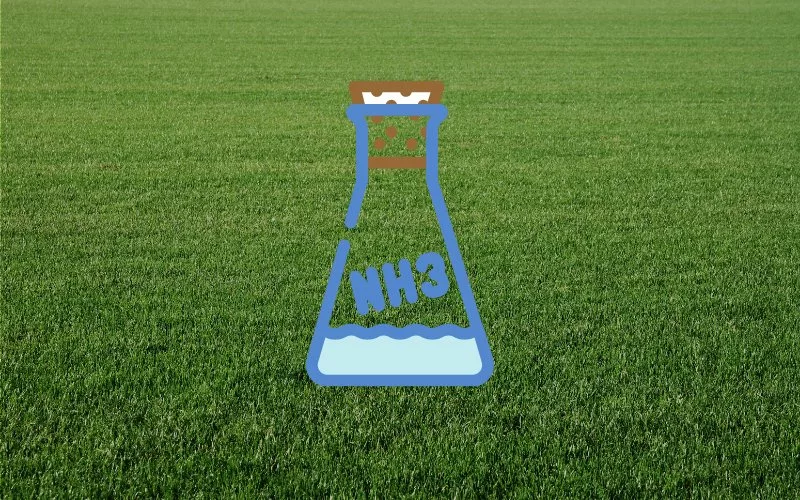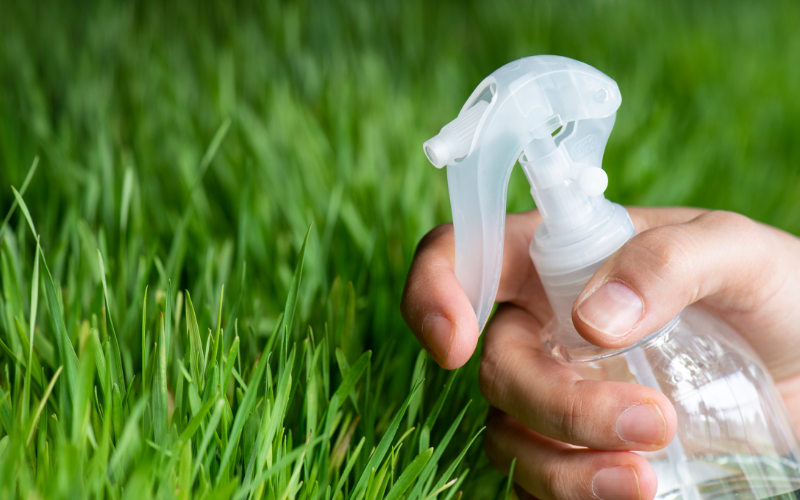Ammonia is a major component in soil fertilizer, laundry detergent, and industrial-strength glass cleaners. The type and quantity of ammonia you use can have a huge difference on whether your grass survives application or thrives on it. The question, “Does ammonia kill grass?” has more variables than most people realize.
While a small amount of anhydrous ammonia can help you grow a lush lawn and give your trees and shrubs a boost, too large of a dose of any ammonia will cause those same plants to turn brown and die back from the root up.

Does Ammonia Kill Grass?
Yes, ammonia will kill grass if it’s overused. When used in its diluted form, ammonia is a great fertilizer for your lawn and garden.
If it’s such a good form of nitrogen and fertilizer, it’s natural to wonder, “Why does ammonia kill grass?” The short answer is that plants love nitrogen but too much nitrogen is overwhelming and can ruin the system those plants have in place to process that nitrogen.
Does Household Ammonia Kill Grass?
Household ammonia is “ammonium hydroxide” and is meant to be a cleaning agent, not a fertilizer. Though it can, if diluted many times over, be used as a fertilizer, it is more likely to burn any plant it is applied to.
If you do want to use “ammonium hydroxide” as a grass or weed killer, use it only in places where you want no plants to grow, such as a sidewalk. After, ensure that no pets or people are in this area until the ammonia has done its job and been washed away to prevent skin irritation and mild chemical burns.
Related Article: What Kills Grass? The Comprehensive Guide

What Does Ammonia Do to Grass?
If you want to get specific, ammonia will kill grass and weeds in several different ways depending on the type of ammonia and the amount used or built up in the soil. Ammonia is an excellent form of nitrogen, which is one of the “big three” lawn fertilizers. Too much nitrogen from ammonia in the soil will reduce root growth and vigor in plants because they don’t need to work for their food and they get a bit burnt out trying to process it all.
Is Ammonia Good for Your Lawn?
Yes, ammonia is good for your lawn in the right dose as it is the most widely-used component of nitrogen fertilizer. Commercial fertilizers are the easiest way to use ammonia in lawn care. You can get similar results using homemade fertilizers if you’re willing to put in the time, effort, and money. For most, this comes with more risk than reward.
What’s the Best Type of Ammonia for Lawncare?
Ammonium nitrate is the safest type of ammonia for fertilizer and lawn care applications. It’s an easy form for plants to take in and is found in most commercial lawn fertilizers. Because this nitrogen is so easy for plants to use, this is the best form for established lawns.
New sod or seedlings may be better off with a diluted form of ammonium sulfate or a product combined with phosphate. This form will absorb more slowly and such a small amount shouldn’t acidify the soil.
Does Grass Absorb Ammonia?
As ammonium nitrate is so easily absorbed, it can be easy to “burn” or overfeed grass, especially new sprouts, plugs, or seedlings. After scattering or spraying the fertilizer on your lawn, use a little irrigation to help “spread out” the mixture and help the nitrogen “stick to” the soil. This may seem counter-intuitive, but studies suggest this helps normalize soil pH and make the most of nitrogen fertilizer.
Household ammonia or “ammonium hydroxide” on the other hand is so strong it will kill any plant it comes into direct contact with, even before it is absorbed into the plant as it can cause actual chemical burns on plants as well as people and animals.
Does Ammonia Kill Tree Roots and Weeds?
While we now know the answer to, “Will ammonia kill grass?”, no lawn exists in isolation from the rest of the natural world. As mentioned above, while several types of ammonia are a good source of nitrogen or nutrition for many plants, there is still the risk of overfeeding. Trees can handle a lot more ammonia exposure than grass and weeds will.
Weeds, on the other hand, are generally about as susceptible to overfeeding as your lawn is. If you have a bare spot or a flowerbed that needs clearing, overfeeding with the right anhydrous ammonia could be a decent strategy. The important thing to remember is that, like a spill, this will kill everything in the topsoil including the seeds of grass and weeds. It may also bring up the acidity of your soil.
To correct this, you will want to either flood the area after all of the plants have died and reapply a small amount of sphagnum peat or coffee grounds to your topsoil. This should help flush excess nitrogen and ammonia further into the ground and readjust the acidity of your soil. Alternatively, an accumulation of rain (about a foot in scattered inches) should do about the same thing. You may want to test your soil before planting to ensure that your pH is in a good range.
Commercial Fertilizer is a Safer Way to Fertilize Your Lawn
While it’s possible to get some benefit from adding a small, diluted amount of household ammonia to your lawn, that’s a risky way to do things. Lawn fertilizer isn’t much more expensive than these chemicals and they come with far more beneficial substances, all in one bag or bottle. Yes, nitrogen is important, but so are phosphorous and potassium.
Adding these nutrients in small amounts at regular intervals with help you develop a more vigorous lawn with tough root systems. Using straight ammonia or household ammonia on your lawn is a “shortcut” not worth taking.


Can I mix muriatic acid and ammonia to kill grass?
Hi Paschal,
I don’t suggest mixing muriatic acid with any other chemicals, only with water. It’s a really caustic chemical that on its own will kill the grass and won’t need any help from ammonia.
I’d also be careful when using it as it can burn the skin and irritate the lungs and nasal passages. Definitely keep any pets and kids away and always use protective gear when handling muriatic acid. I personally would stick to ammonia since it is less hazardous when diluted.
Good luck and thanks for your comment.
Tom.